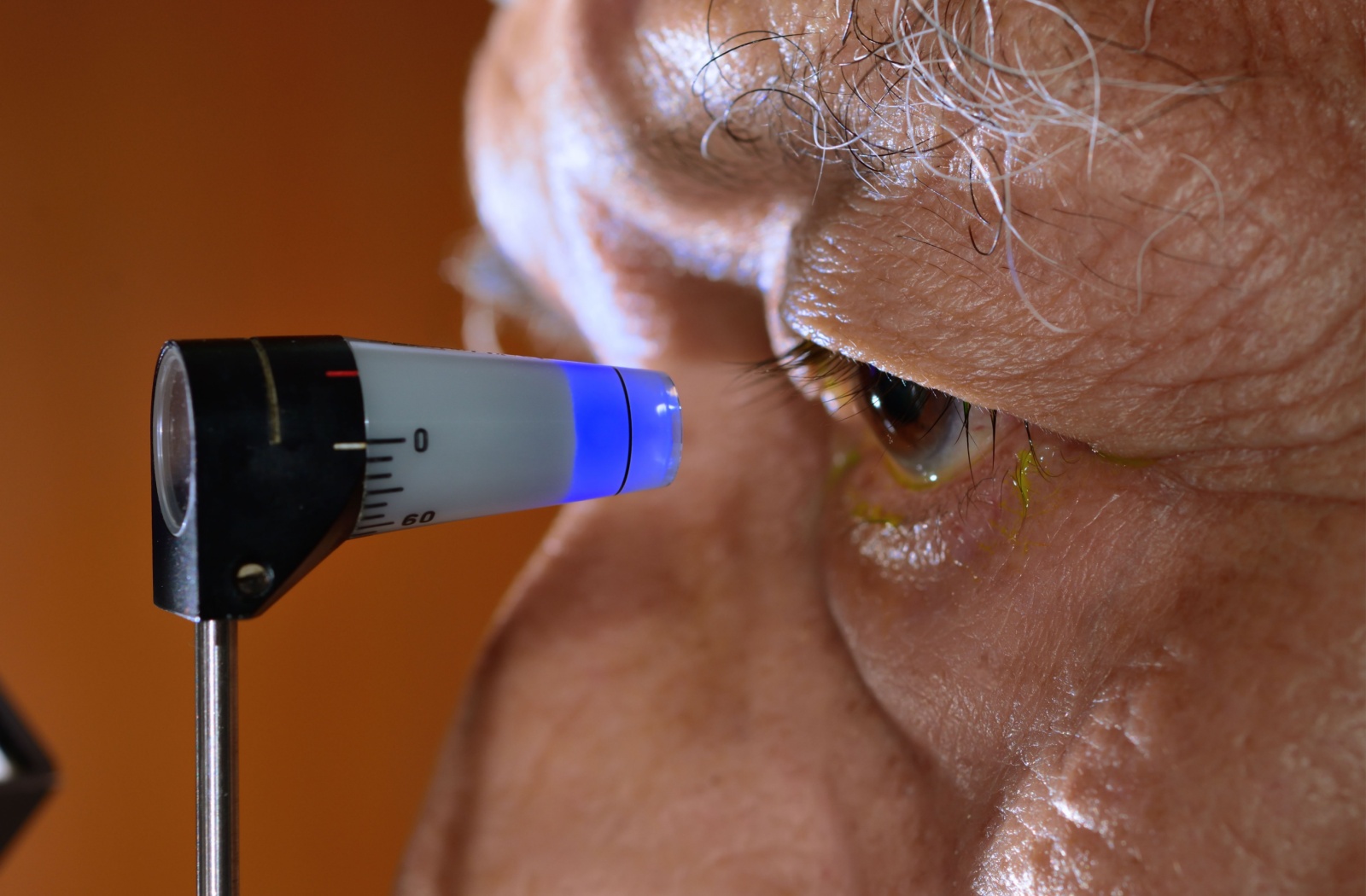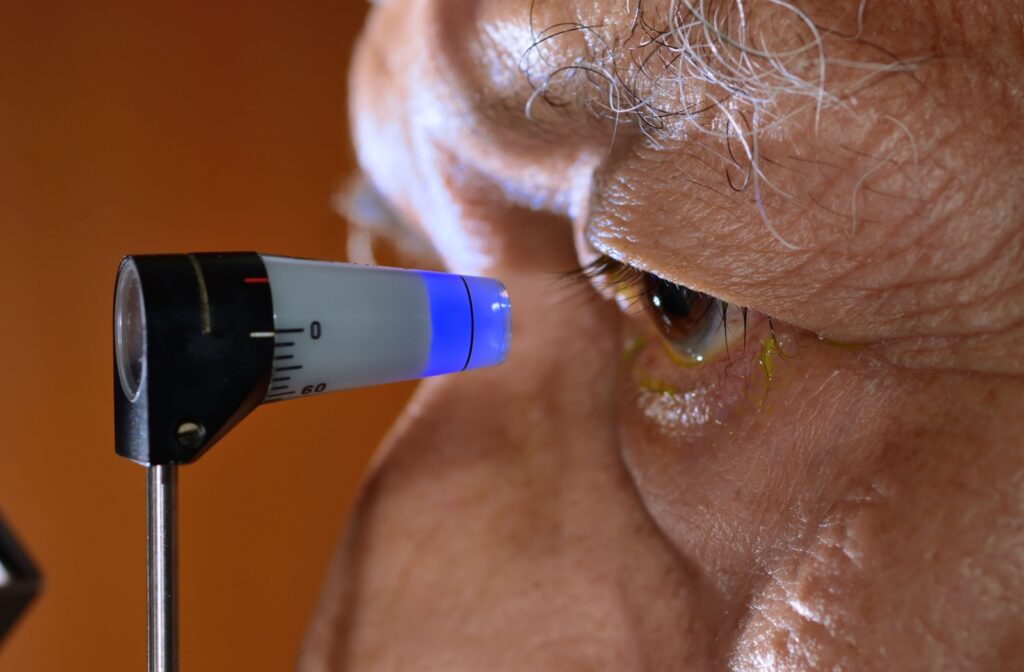Glaucoma is a complex eye condition that can lead to all kinds of vision problems. If left untreated glaucoma can lead to blindness. Conditions like glaucoma aren’t caused by one single thing—there are plenty of underlying factors that affect the likelihood of this condition.
One key contributing factor to glaucoma is genetics. Glaucoma has a strong hereditary component—if a family member has this condition, you’re much more likely to develop it yourself. Glaucoma is a serious eye disease that shouldn’t be taken lightly, and regular eye exams are key to detection and preventing vision loss.
What Is Glaucoma?
Glaucoma is a group of eye conditions that results in optic nerve degeneration. This degeneration is usually caused by high intraocular pressure (your eye pressure). This pressure is not necessarily related to blood pressure.
As intraocular pressure increases, the pressure squeezes and damages the optic nerve. This damage is permanent. It is a painless disease process where the peripheral vision is compromised first while the central vision stays normal until its end stage. This is the reason why it’s impossible to self-diagnose glaucoma or rely on symptoms to diagnose the disease. For this reason, glaucoma is often called “the silent thief of sight.” If you have a family history of glaucoma, you should be getting annual eye exams with your optometrist in order to detect the condition as early as possible to preserve your optic nerve and vision.
The Different Types of Glaucoma
There are several types of glaucoma, each presenting unique symptoms and risks. Understanding these differences is crucial to effectively manage and treat the condition..
Open-Angle Glaucoma
Open-angle glaucoma is the most common form of glaucoma. It’s characterized by a gradual increase in intraocular (eye) pressure over time due to either overproduction of fluid or decrease in fluid draining inside the eye.
The symptoms of open-angle glaucoma include:
- Gradual loss of peripheral vision
- Painless progression
- Tunnel vision in advanced stages
Open-angle glaucoma is slow and subtle, but the damage it causes is permanent. Don’t put your vision at risk, especially if you have a family history of glaucoma. See your optometrist annually to rule out glaucoma.
Closed-Angle Glaucoma
Closed-angle glaucoma, also called angle-closure glaucoma, is less common but more problematic. It occurs when the drainage angle is completely blocked, which results in a rapid increase in eye pressure. Closed-angle glaucoma is considered a medical emergency due to its speed of onset. If left untreated, it can cause permanent blindness very quickly.
The symptoms of closed-angle glaucoma include:
- Severe eye pain
- Blurred vision
- Nausea and vomiting
Immediate treatment is essential to prevent permanent vision loss. If you notice any significant eye pain, eye redness, or sudden nausea accompanied by vision problems, contact an optometrist or emergency room.
Normal-Tension Glaucoma
Normal tension glaucoma happens even when eye pressure is within the normal range. Despite this, the optic nerve can still be degenerating or damaged. The causes of normal-tension glaucoma aren’t entirely understood but may likely involve poor blood flow to the optic nerve.
The symptoms of this condition include:
- Peripheral vision loss
- Possible eye discomfort
- No noticeable symptoms
Regular monitoring and comprehensive eye exams are essential to managing normal tension glaucoma.
Secondary Glaucoma
Secondary glaucoma is a tricky type of glaucoma. It develops with another eye condition or with injury to the eye causing increases to your eye pressure. This can vary significantly, but typically causes:
- Vision changes
- Symptoms similar to other types of glaucoma
- Eye discomfort or pain
Treatment focuses on managing both the primary cause of glaucoma as well as the glaucoma itself. To identify secondary glaucoma, your optometrist will need to determine the underlying cause of your symptoms. This helps them devise a specific treatment plan for your unique needs.
Is Glaucoma Genetic?
Glaucoma is a complicated condition. Its causes aren’t fully understood, though they’re closely related to the drainage systems inside the eye. These can be affected by your specific genetic makeup—if you have a family history of glaucoma, your chance of developing the same type significantly increases.
Understanding your genetic risk is extremely important. If you’re at risk of developing glaucoma, visit your optometrist so they can measure your intraocular pressure.
Remember, glaucoma is subtle and can be almost impossible to self-diagnose. Don’t put your vision at risk—not when your optometrist can help.
Get Checked for Glaucoma
Glaucoma can be complex and early intervention is critical to preserving your vision. If you have a family history of glaucoma or other risk factors such as nearsightedness, sleep apnea, cardiovascular conditions, or suspicious looking optic nerves, schedule an appointment with one of our eye doctors at Luminance Vision trained to diagnose, treat and manage glaucoma.
We will work with you to determine your risk of glaucoma and help you make a plan to keep your vision clear. Request an appointment with us today to get checked for glaucoma.




